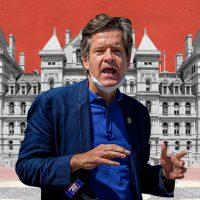Opposing tax increases in New York is not for the faint of heart, it turns out.
A business group purporting to represent real estate interests, among others, partially disintegrated in its first month amid a backlash against its objection to tax increases, the Wall Street Journal reported.
Read more


Former New York governor David Paterson quit as chairman last week and the New York City Hospitality Alliance, Riders Alliance, Tech:NYC and New York League of Conservation Voters abandoned the effort as well when it became clear that opposing tax increases was at the top of its funders’ agenda.
Those funders have yet to be identified by Tusk Strategies, which convened the organization in July, but a spokesperson told the Journal that it involved Wall Street and would soon launch an advertising campaign. Tusk’s founder, Bradley Tusk, has worked with a number of billionaires from the financial world, including Daniel Loeb and Michael Bloomberg, as a strategist for political campaigns and charter schools.
Neither the Real Estate Board of New York nor the Partnership for New York City are involved in the new group, called the Campaign for New York’s Future. REBNY and the Partnership were key players in a similar effort in 2011 and 2012.
Advocates for taxing the wealthy criticized members of the group on social media for their involvement. With the city and state both facing budget deficits of unprecedented size and suddenness, progressives are pushing for the state to impose a second income tax on high earners, a tax on assets and an annual property tax surcharge on high-value second homes.
New York last year extended its so-called millionaires’ tax rate of 8.82 percent through 2024; this year it applies to single filers earning at least $1.08 million or joint filers earning twice as much. Combined with the city’s top rate of 3.876 percent, high-income earners pay 12.7 percent in state and local taxes, among the most in the country.
Nonetheless, it is believed that more billionaires live in New York than any other city. But Gov. Andrew Cuomo opposes a new income tax, saying it would cause some of them to change residency to another state.
That scenario could be more likely with indoor dining and theaters shut down indefinitely in the city. An estimated 420,000 New Yorkers fled the city after the pandemic struck in March. [WSJ] — Erik Engquist
